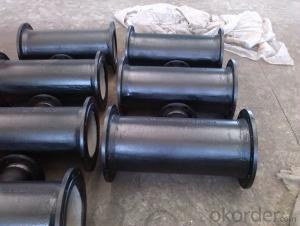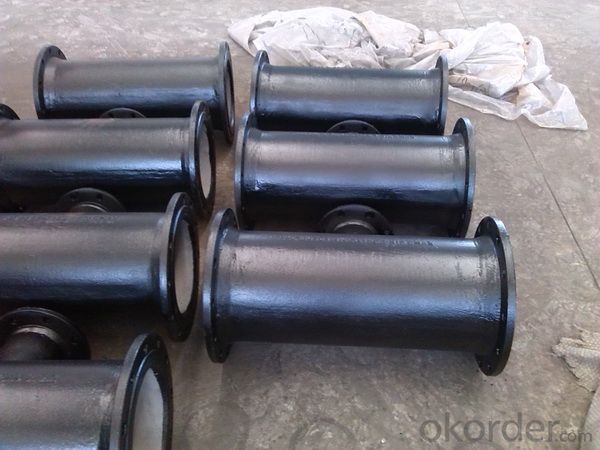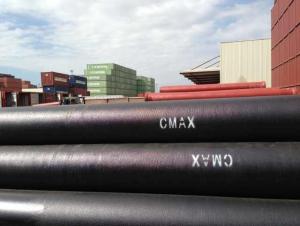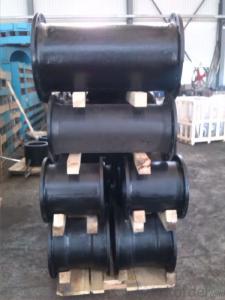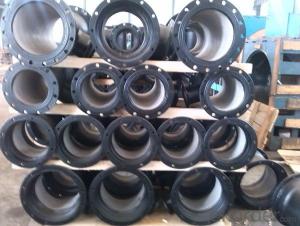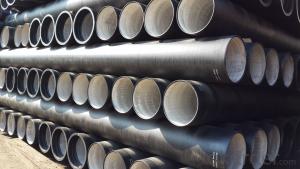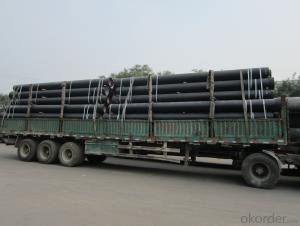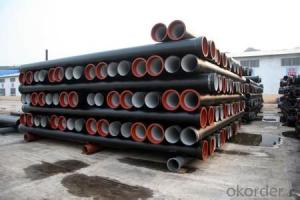DUCTILE IRON PIPE D400 k12
- Loading Port:
- Tianjin
- Payment Terms:
- TT OR LC
- Min Order Qty:
- -
- Supply Capability:
- 30000Tons m/month
OKorder Service Pledge
OKorder Financial Service
You Might Also Like
CNBM ductile iron pipe ranges from DN80-DN1600mm (T-Type, Class K9), effective length 6m, comply with ISO2531 Standard
Company Profile
CNBM International Corporation is the leading production base and renowned supplier of Ductile Iron Water Pipe systems of both potable and waste water in China. We are constantly looking to develop high quality products to ensure the longest service life and wonderful performance.
CNBM Pipelines regard quality as the essential factor leading to successful business. Every pipe is tested in accordance with BS EN545 (water application) or BS EN598 (sewer application). CNBM Pipelines products comply with and are tested according to the relevant European and International Standards. Our pipes are manufactured under the quality management system BS EN ISO 9001. After years of efforts, CNBM Pipelines has built up great reputation in terms of quality and service among customers worldwide
Product Introduction
CNBM ductile iron pipe ranges from DN80-DN1600mm (Tyton, T-Type, Class K7/K8/K9), effective length: 6m, complying with BS EN545/EN598/ISO2531/BS4772.
Specification& Payment terms
Internal lining: Pipes shall have an internal cement mortar lining in acc with ISO4179.
External coating: Pipes shall be externally coated with metallic zinc spray plus a further layer of resin painting to ISO8179.
Gasket: 100% SBR/NBR/EPDM gasket in accordance with ISO4633.
Packing: Pipes from DN100 to DN300 be bundled with steel belts, the others are in bulk.
Payment term: By 30% T/T advance payment + 70% Irrevocable L/C at sight.
Packing: In bulk vessel or in container.
- Q: What is the cost of ductile iron pipes compared to other materials?
- Several factors, such as size, length, and application, can cause the cost of ductile iron pipes to vary when compared to other materials. Generally, ductile iron pipes are more expensive than PVC or HDPE pipes due to their superior strength, durability, and longevity. Although the initial cost of ductile iron pipes may be higher, they offer a cost-effective solution in the long term because of their extended lifespan. With a life expectancy of over 100 years, ductile iron pipes are reliable and require minimal maintenance for water, sewage, and gas distribution systems. This longevity reduces the need for frequent replacements, repairs, and associated expenses. Additionally, ductile iron pipes are known for their exceptional resistance to external loads, pressure, and corrosion, making them suitable for various applications, including high-pressure water and gas transmission, industrial pipelines, and sewer systems. The inherent strength of ductile iron pipes allows for thinner walls, resulting in reduced material and installation costs compared to other materials. It is important to consider that the cost of ductile iron pipes can also be influenced by market conditions, transportation costs, and the availability of raw materials. Therefore, it is advisable to consult with suppliers and conduct a cost-benefit analysis before making a decision.
- Q: Can ductile iron pipe be used for water treatment plants?
- Yes, ductile iron pipe can be used for water treatment plants. Ductile iron pipes are known for their strength, durability, and corrosion resistance, making them suitable for transporting water and other fluids in various industrial applications, including water treatment plants.
- Q: Are ductile iron pipes suitable for trenchless installation methods?
- Yes, ductile iron pipes are suitable for trenchless installation methods. They possess the necessary strength and flexibility to withstand the installation process without compromising their structural integrity. Additionally, their corrosion resistance and durability make them a reliable choice for trenchless installations.
- Q: Can ductile iron pipes be used in areas with high soil salinity?
- Yes, ductile iron pipes can be used in areas with high soil salinity. Ductile iron pipes have excellent corrosion resistance and are often used for underground applications, including in areas with high soil salinity. The pipes are specially coated to prevent corrosion and are known for their durability and long service life, making them suitable for such environments.
- Q: What are the typical joint restraint requirements for ductile iron pipes under pressure?
- In order to meet the joint restraint requirements for ductile iron pipes under pressure, there are two common options available: mechanical joint restraints and restrained joint systems. These restraints are essential to prevent separation or pulling apart of the pipes caused by internal pressure. A mechanical joint restraint, which is widely used, involves a series of bolts and clamps that securely hold the pipes together. These restraints are applied at each joint of the ductile iron pipes to ensure a tight and secure connection. By providing axial restraint, they prevent the pipes from separating along the pipe axis. Another option is the restrained joint system, which offers both axial and angular restraint. This system includes a specially designed joint that consists of a gasket, a restraining gland, and a series of bolts or wedges. The gasket ensures a watertight seal, while the restraining gland and bolts/wedges restrain the pipe joints, preventing separation under pressure. The specific requirements for joint restraints may vary depending on factors such as the pipe's diameter, wall thickness, and operating conditions. To determine the appropriate joint restraint system for a specific application, it is crucial to consult the manufacturer's guidelines and industry standards. Furthermore, proper installation and maintenance of the joint restraints are essential to ensure their effectiveness and longevity in restraining the pipes.
- Q: Are ductile iron pipes suitable for use in hydroelectric dams?
- Hydroelectric dams benefit from the suitability of ductile iron pipes. Ductile iron, a more flexible and stronger type of iron compared to traditional cast iron, is an ideal option for various applications, including water transmission systems in hydroelectric dams. Ductile iron pipes possess durability and resistance to corrosion, which is essential in the continuous water exposure environment of a dam. They can endure high pressures and extreme temperatures, making them fitting for the demanding conditions within hydroelectric dams. Moreover, ductile iron pipes exhibit excellent joint integrity, guaranteeing their leak-proof and reliable performance throughout their lifespan. This aspect is crucial for maintaining the efficiency and effectiveness of a hydroelectric dam's water transmission system. Additionally, ductile iron pipes prove to be cost-effective when compared to materials like steel or concrete. With a long service life, minimal maintenance requirements, and easy availability, they present a practical choice for hydroelectric dam projects. In conclusion, ductile iron pipes are a viable option for hydroelectric dams due to their durability, corrosion resistance, high-pressure tolerance, joint integrity, and cost-effectiveness. They provide the necessary strength and flexibility to efficiently transport water within the dam, contributing to the overall success and longevity of the hydroelectric power generation system.
- Q: How does ductile iron pipe perform in areas with high groundwater contamination?
- Ductile iron pipe is renowned for its durability and resistance to corrosion, rendering it an appropriate option for regions with significant groundwater pollution. By means of its protective lining and coating, the pipe effectively obstructs direct contact between the iron and groundwater, thereby minimizing the likelihood of corrosion and decay. Furthermore, ductile iron pipe possesses the capacity to withstand external pressures, making it less susceptible to harm resulting from shifting soils or groundwater flow. This characteristic proves particularly advantageous in areas with high groundwater contamination as it guarantees the pipe's structural integrity remains intact, preventing leaks or bursts. Moreover, ductile iron pipe boasts a lengthy service life, which in turn diminishes the necessity for frequent replacements and reduces the potential for groundwater pollution caused by pipe failures. On the whole, ductile iron pipe performs exceptionally well in regions plagued by high groundwater contamination, providing a dependable and robust solution for transporting water or wastewater while simultaneously safeguarding the surrounding environment.
- Q: What is the typical diameter range of ductile iron pipes?
- The typical diameter range of ductile iron pipes varies depending on the specific application and industry standards. Generally, ductile iron pipes come in a wide range of diameters to accommodate various needs. In water distribution systems, the typical diameter range can vary from as small as 3 inches (76 mm) to as large as 64 inches (1626 mm) or even larger. For sewer and wastewater systems, the typical diameter range is usually between 4 inches (102 mm) to 48 inches (1219 mm). However, it is important to note that these ranges are not exhaustive and there may be instances where ductile iron pipes are available in sizes outside of these common ranges. It is always advisable to consult industry standards and specific project requirements to determine the appropriate diameter range for ductile iron pipes.
- Q: How are ductile iron pipes protected against external impact or loading?
- Ductile iron pipes undergo various methods and measures to safeguard them against external impact or loading, guaranteeing their durability and integrity. Several common approaches are employed to protect ductile iron pipes, including: 1. Adequate Thickness and Strength: Ductile iron pipes are designed with ample wall thickness and high strength to withstand external loads and impacts. This design feature ensures that the pipes can endure heavy loads without deforming or cracking. 2. Implementation of Coatings: Ductile iron pipes are typically coated with protective layers to create an additional barrier against external impact. These coatings may comprise cement mortar lining, polyethylene encasement, or epoxy coatings. They not only grant impact resistance but also safeguard against corrosion. 3. Utilization of Proper Bedding and Backfilling Techniques: Proper techniques for bedding and backfilling are crucial in protecting ductile iron pipes from external loads. The correct placement of pipes within suitable materials, such as compacted granular bedding and backfill, helps distribute external loads evenly and minimizes the risk of pipe damage. 4. Consideration of Trench Design: The design of the trench in which ductile iron pipes are installed plays a vital role in safeguarding them against external impact. The dimensions of the trench, slope stability, and proper compaction of the backfill are all taken into account to reduce the likelihood of damage caused by external loads. 5. Implementation of Effective Pipe Layout and Support: Appropriate pipe layout and support are essential for protecting ductile iron pipes from external impact. Sufficient support mechanisms, including thrust blocks, pipe anchors, and pipe restraints, are utilized to absorb and distribute external loads, preventing any damage to the pipes. 6. Installation of Protective Structures: In areas where the risk of external impact is higher, additional protective structures are installed to safeguard ductile iron pipes. These structures may include concrete encasements, bollards, or reinforced concrete slabs, which act as physical barriers against potential impacts. In conclusion, a combination of factors, including pipe strength, coatings, proper installation techniques, and support measures, work together to ensure the protection of ductile iron pipes against external impact or loading. These measures enhance the longevity and reliability of the pipes, guaranteeing efficient performance in various applications.
- Q: Can ductile iron pipe be used for marine applications?
- Yes, ductile iron pipe can be used for marine applications. Ductile iron is a type of cast iron that possesses high strength, durability, and resistance to corrosion. These properties make it suitable for various marine environments, including saltwater applications. Ductile iron pipes are commonly used for marine applications such as seawater intake and outfall systems, offshore oil and gas platforms, submarine pipelines, and marine dredging projects. The corrosion-resistant nature of ductile iron helps protect against the harsh conditions found in marine environments, such as corrosive saltwater, tidal currents, and marine organisms. Additionally, ductile iron pipes are known for their excellent mechanical properties, including high tensile strength and impact resistance, which further enhance their suitability for marine applications. Overall, ductile iron pipe is a reliable and cost-effective choice for various marine applications.
Send your message to us
DUCTILE IRON PIPE D400 k12
- Loading Port:
- Tianjin
- Payment Terms:
- TT OR LC
- Min Order Qty:
- -
- Supply Capability:
- 30000Tons m/month
OKorder Service Pledge
OKorder Financial Service
Similar products
Hot products
Hot Searches
Related keywords
